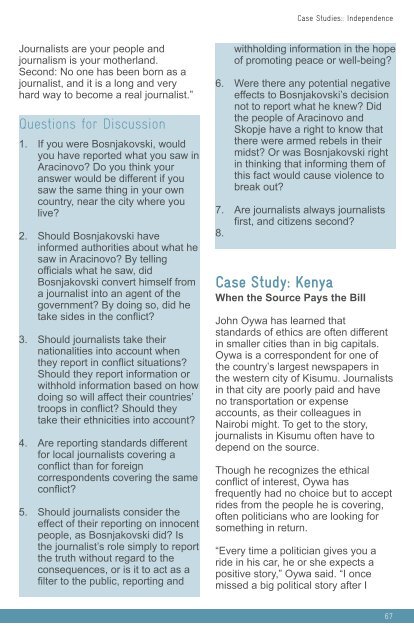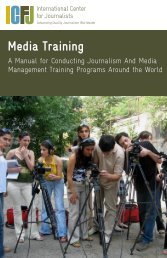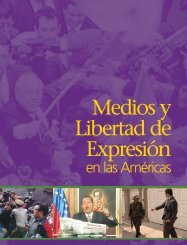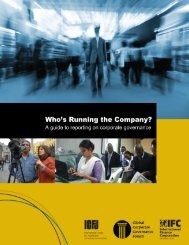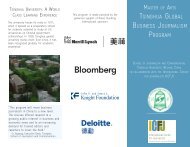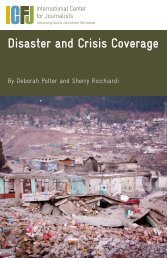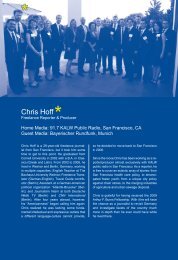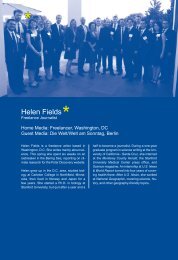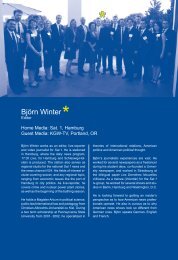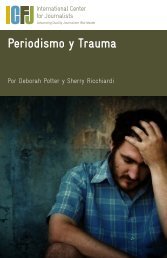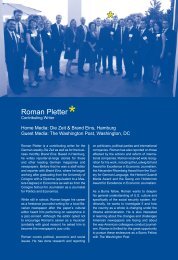Download PDF - International Center for Journalists
Download PDF - International Center for Journalists
Download PDF - International Center for Journalists
You also want an ePaper? Increase the reach of your titles
YUMPU automatically turns print PDFs into web optimized ePapers that Google loves.
Case Studies:: Independence<br />
<strong>Journalists</strong> are your people and<br />
journalism is your motherland.<br />
Second: No one has been born as a<br />
journalist, and it is a long and very<br />
hard way to become a real journalist.”<br />
Questions <strong>for</strong> Discussion<br />
1. If you were Bosnjakovski, would<br />
you have reported what you saw in<br />
Aracinovo? Do you think your<br />
answer would be different if you<br />
saw the same thing in your own<br />
country, near the city where you<br />
live?<br />
2. Should Bosnjakovski have<br />
in<strong>for</strong>med authorities about what he<br />
saw in Aracinovo? By telling<br />
officials what he saw, did<br />
Bosnjakovski convert himself from<br />
a journalist into an agent of the<br />
government? By doing so, did he<br />
take sides in the conflict?<br />
3. Should journalists take their<br />
nationalities into account when<br />
they report in conflict situations?<br />
Should they report in<strong>for</strong>mation or<br />
withhold in<strong>for</strong>mation based on how<br />
doing so will affect their countries’<br />
troops in conflict? Should they<br />
take their ethnicities into account?<br />
4. Are reporting standards different<br />
<strong>for</strong> local journalists covering a<br />
conflict than <strong>for</strong> <strong>for</strong>eign<br />
correspondents covering the same<br />
conflict?<br />
5. Should journalists consider the<br />
effect of their reporting on innocent<br />
people, as Bosnjakovski did? Is<br />
the journalist’s role simply to report<br />
the truth without regard to the<br />
consequences, or is it to act as a<br />
filter to the public, reporting and<br />
withholding in<strong>for</strong>mation in the hope<br />
of promoting peace or well-being?<br />
6. Were there any potential negative<br />
effects to Bosnjakovski’s decision<br />
not to report what he knew? Did<br />
the people of Aracinovo and<br />
Skopje have a right to know that<br />
there were armed rebels in their<br />
midst? Or was Bosnjakovski right<br />
in thinking that in<strong>for</strong>ming them of<br />
this fact would cause violence to<br />
break out?<br />
7. Are journalists always journalists<br />
first, and citizens second?<br />
8.<br />
Case Study: Kenya<br />
When the Source Pays the Bill<br />
John Oywa has learned that<br />
standards of ethics are often different<br />
in smaller cities than in big capitals.<br />
Oywa is a correspondent <strong>for</strong> one of<br />
the country’s largest newspapers in<br />
the western city of Kisumu. <strong>Journalists</strong><br />
in that city are poorly paid and have<br />
no transportation or expense<br />
accounts, as their colleagues in<br />
Nairobi might. To get to the story,<br />
journalists in Kisumu often have to<br />
depend on the source.<br />
Though he recognizes the ethical<br />
conflict of interest, Oywa has<br />
frequently had no choice but to accept<br />
rides from the people he is covering,<br />
often politicians who are looking <strong>for</strong><br />
something in return.<br />
“Every time a politician gives you a<br />
ride in his car, he or she expects a<br />
positive story,” Oywa said. “I once<br />
missed a big political story after I<br />
67


